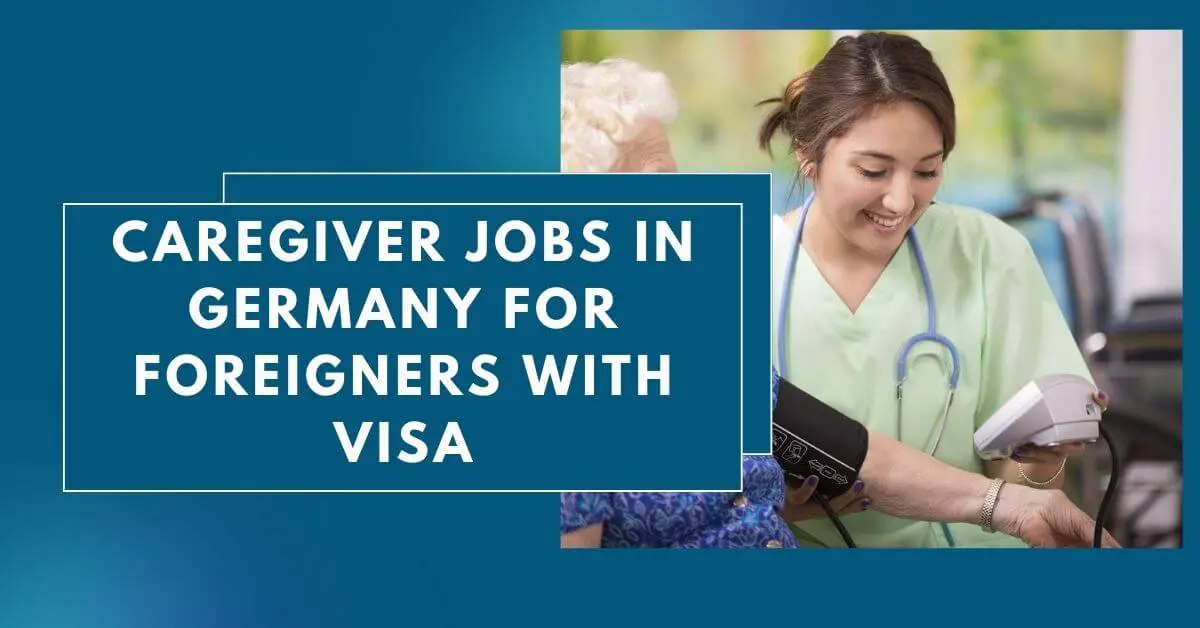Caregiver Jobs in Germany for Foreigners With Visa 2024

For expatriates seeking employment in Germany, the health and elderly care sectors cannot be ignored. With seven and a half million employees, the German healthcare industry is one of the country’s largest employers and also the one with the most job openings. In addition to the 5,000 additional physicians required in the industry, there is a severe shortage of nurses and caregivers, among other healthcare professionals.
By the end of 2021, approximately 13% of the 1.67 million nurses and caregivers employed in German healthcare facilities (1.04 million nurses and 0.63 million caregivers) were foreign nationals. However, many more are required, as one nurse in Germany cares for thirteen patients compared to six in the United States. There are nearly 200,000 unadvertised nursing job openings that are impossible to fill, and the situation is deteriorating daily.
This is primarily due to the aging of the population, as the proportion of geriatric patients increases while hundreds of thousands of nursing employees retire. In order to prevent staff shortages, an estimated 500,000 nursing personnel (including nurses, caregivers, and nursing assistants) would need to be employed by 2030. Today, however, a nursing staff vacancy remains vacant for an average of 240 days.
List Of Caregiver Jobs in Germany for Foreigners With Visa:
1. Where are the Nursing Job Vacancies?
Geriatric care is the fastest-growing segment of the German healthcare industry and consequently has the most open nursing positions. This situation is the result of the aging of the population and the retirement of the “baby boomer” generation, which began only recently and will continue for the next two decades.
Germany has one of the highest life expectancies in Europe (78.2 years for men and 83.2 years for women, for a total of 80.7 years), and 1.5 million Germans are over the age of 90. By the end of 2021, there will be 4.6 million care-dependent Germans, the majority of whom will be elders, which is twice as many as ten years ago.
As the baby boomer demographic ages, the demand for long-term geriatric care is projected to continue rising over the next 15 to 20 years. In Germany, 627,900 people were employed in geriatric care at the end of 2021, and many more will be required in the future. However, for every 100 open positions in geriatric nursing, there are only about 35 qualified applicants.
2. German Government’s Support for Recruiting Foreign Nurses
The German government is interested in recruiting migrant nurses, especially from nations with a high unemployment rate among nurses. Among the active government initiatives geared at recruiting foreign nurses for the German health and elderly care sectors are:
- Triple Win Project: In 2013, the German government signed bilateral agreements with the governments of Bosnia, Serbia, the Philippines, and Tunisia known as the “Triple Win Project” to assist nurses from these countries in finding employment in Germany (for more information on the Triple Win Project for the Philippines, please see this pdf). India, Indonesia, Jordan, and Vietnam have subsequently been added to the list of participating nations.
- Nursing Professionals for Germany: (“Pflegekräfte für Deutschland”) is an extension of the above-mentioned “Triple Win Project,” which is also organized by the Federal Employment Agency but operates as a separate program concentrating on the hiring of nursing professionals from Brazil and Mexico. Before departing for Germany, selected candidates will complete German language courses in their home country and have their qualifications recognized by German authorities.
- Fair Recruitment of Nurses Germany: (“Faire Anwerbung Pflege Deutschland”) is an initiative of the Federal Ministry of Health to recruit qualified foreign nursing personnel for German hospitals and nursing homes from Latin America and Asia, primarily from Mexico, Brazil, Colombia, the Dominican Republic, the Philippines, India, and Indonesia. This initiative provides financial assistance to German employers seeking nursing personnel in these far-flung foreign countries in order to assist them in covering a portion of the associated expenses.
However, Germany welcomes nursing personnel from countries other than those listed above, provided they satisfy the necessary professional qualifications and learn German. In addition, the German government encourages foreigners to complete nursing training programs in Germany in order to qualify for employment in the German health and geriatric care sectors. Currently, Spain, Poland, Croatia, and other East European nations provide the majority of nurses to the German healthcare sector.
3. Salaries of the Nursing Personnel in Germany
Even for comparable positions, salaries in the nursing industry vary significantly. They are influenced by several main factors, including the federal state where the work is performed, the size and type of the employer, and the employee’s qualifications, experience, and professional specialization. In general, the southern federal states have the highest salaries, while the northeast, or former East Germany, has the lowest.
In most instances, the larger the employer, the greater the compensation for the same labor. In the public sector, the public service collective bargaining agreement determines pay rates, whereas, in the private sector, wages are negotiable on an individual basis. However, this does not necessarily imply that they are higher. Usually, the opposite is true due to the frequent exploitation of (mostly foreign) workers in the private sector, especially in households. However, one significant factor that is entirely under your control is your credentials and talents.
Depending on additional qualifications, specialization, professional experience, and location, the starting salary of a registered general nurse in Germany can easily reach EUR 3,500 per month (approximately EUR 2,200 netto for a single person without children and without religious affiliation). Office nurses have the lowest average monthly salaries (3,350 EUR) because they do not have work schedules. In Germany, the greatest demand is for geriatric nursing personnel.
The average monthly salary of a geriatric nurse is EUR 4,250, which is significantly higher than the national average for a nurse (EUR 3,650). Likewise, the majority of other specialist nurses (operating room nurses, emergency room nurses, palliative care nurses, etc.) earn an average of 4,250 euros per month. Senior nurses with specialist credentials and supervisory responsibilities, however, make the highest salaries, averaging about EUR 4,500 (roughly EUR 2,850 netto) per month.
3.1. Median Salaries for Selected Nursing Professions in Germany
| Profession | EUR monthly |
| Office nurse | 3,350 |
| Nurse in hospital | 3,800 |
| Geriatric nurse | 4,250 |
| Paediatric nurse | 3,800 |
| Hospital environment hygiene nurse | 4,000 |
| Dialysis nurse | 4,250 |
| Palliative care nurse | 4,250 |
| Emergency room nurse | 4,250 |
| Operating room nurse | 4,250 |
| Senior nurse | 4,500 |
| Nurse average | 3,650 |
| Nursing assistant | 2,900 |
| Senior caregiver | 3,350 |
| Caregiver assistant | 2,350* |
During the first year of employment, foreign nurses with German fluency issues typically do not assume full responsibility due to intensive language training. Thus, they earn less, approximately EUR 2,460 per month (approximately EUR 1,730 netto), which is the beginning salary for a nursing assistant in Germany. Once a candidate obtains a B2 German language certificate and is recognized as a registered general nurse, their monthly salary increases by approximately 400 euros.
The minimum starting remuneration for a senior caregiver is at least 3,175 euros per month; see the section below), while those with ten years of experience can earn up to 3,550 euros per month. In 2022, the median monthly salary of a senior caregiver in Germany was 3,350 EUR. The minimal monthly wage for caregiver assistants has been EUR 2,460. Please note that salary statistics differ based on the source used. Please refer to this article for more information on salary levels in Germany, the calculation of deductions (taxes and social security contributions), and the cost of living in Germany.
The COVID years have revealed long-ignored flaws in the German healthcare sector, such as the challenging working conditions of the caregiving staff. To alleviate the situation, the government approved measures designed to increase the desirability of caregiving positions in order to attract a greater number of job seekers. For instance, there will no longer be unpaid overtime, and four increases to the minimum hourly wage in 2022 have made the salaries of the caregiving staff more lucrative.
As a consequence, the minimum hourly wage for a senior caregiver is 18.25 euros, for a junior caregiver, it is 15.25 euros, and for a caregiver assistant, it is 14.15 euros. Based on a 40-hour work week, this translates to minimum monthly salaries of 3,175 euros, 2,654 euros, and 2,462 euros, respectively (further information is available in German at the Federal Ministry of Labour). These minimum earnings are mandatory for all public-sector employers.
However, the aforementioned minimum wage increase does not apply to private household caregivers, the majority of whom are from Eastern Europe. Currently, they earn a minimum of 12 euros per hour (as of October 1, 2022), but even this reduced rate pertains only to employees and not independent contractors. Additionally, please note that church-run healthcare facilities have their own pay rates and are therefore not subject to any of the aforementioned pay increases.

4. Regulation of the Nursing Profession in Germany
The official term for a registered nurse in Germany is Handels- und Krankenpfleger. Therefore, the term ‘Krankenschwester’ is no longer used officially. In the past, the majority of German nurses were educated in three-year vocational programs at hospital-affiliated nursing institutions; however, more recently, nurses have also received education in colleges and graduated with a Bachelor of Science in nursing.
To be registered with the health authority of the corresponding federal state as a “general” nurse, candidates must pass an official, standardized exam at the conclusion of both programs. There is a one-time fee associated with registration, but there are no ongoing costs.
In contrast to nurses, nursing assistants (German: Gesundheits- und Krankenpflegehelfer) are not regulated in Germany. In Germany, nursing assistants, also known as healthcare assistants, attend one-year vocational programs in the same institutions as registered nurses. In order to practice their profession, they are not required to pass a standardized exam, but they must demonstrate their suitability for the position to the local health authority of the federal state.
5. Qualification Requirements for Nursing Personnel in Germany
As stated previously, German nurses complete a three-year vocational training program at a higher education institution or receive a Bachelor of Science in nursing from a university. Later on, many nurses continue their education by enrolling in specialized programs (such as intensive care, palliative care, home care, oncology, anesthesia, psychiatry, and sanitation, among others). Nursing assistants are required to have completed a one-year vocational program at a nursing institution of higher education. Some universities have recently introduced nursing assistant programs for students with a secondary education in a field unrelated to healthcare.
Foreign nurses and nursing assistants seeking to work in Germany must demonstrate equivalent professional qualifications and skills (usually a minimum of two years of work experience) to their German counterparts. In addition, they must pass a German language proficiency exam at level B2 (for more information on German language proficiency tests, see this article), be in excellent physical condition, and have no criminal record. Language proficiency is frequently the greatest barrier to entry for foreign nurses, as they must not only communicate with their patients in German but also document their work in German.
6. Recognition of Foreign Nursing Qualifications in Germany
Foreign nurses seeking employment in Germany must demonstrate to the local health authority of the federal state in which they desire to work that their professional qualifications meet German standards for a registered nurse.
6.1. Automatic Recognition of Nursing Diplomas from EU and EFTA
If obtained after their country joined the EU or EFTA, certified nurses from the European Economic Area (the EEA includes the EU and EFTA, as well as Iceland, Lichtenstein, and Norway) will have their credentials automatically recognized. To receive automatic recognition, petitioners who obtained their credentials before their country acceded to the EU or EFTA must submit a certificate of compliance with the minimum standards outlined in EU Directive 2005/36/EC. The relevant health authority of the E.E.A. member state in which the person received their education must issue this certificate.
6.2. Assessment of Nursing Qualifications from Third Countries
Citizens from third nations must have their professional credentials evaluated by the health authority of the federal state in which they desire to work in comparison with the German nursing diploma. This could take three months.
Additional required documents include a curriculum vitae, other professional certificates (such as diplomas for geriatric nursing), evidence of relevant professional experience, a medical certificate, and a certificate of no criminal record. The ‘Recognition in Germany’ page provides additional information on the recognition of foreign nursing diplomas. Alternatively, consult this PDF for a summary of the requirements. If you are truly committed to working as a nurse in Germany, you should also read this comprehensive guide.
As stated in the preceding section, foreigners wishing to work as nursing assistants in Germany must also submit their diplomas, proof of professional experience, and other pertinent documents (language certificate, medical certificate, and criminal record certificate) to the local health authority of the respective federal state. This procedure is state-specific and less rigorously regulated than nursing procedures. No registration is required; only a permit is required to practice the profession.
7. Options for Those Who Fail to Meet Qualification or Language Requirements
Applicants who do not satisfy the professional qualification requirements for a registered nurse will have the option of taking a standardized examination or pursuing up to three years of additional training. Before they can obtain the title of a registered nurse, some foreign nurses may be required to complete internships due to a paucity of clinical experience.
Applicants for the position of a registered nurse who do not satisfy the German language proficiency requirements (level B2) but who achieve at least level B1 will be permitted to work as a nursing assistant while enrolled in an intensive language course. After obtaining a B2 German language certificate, they will be granted the title of a registered nurse.
In the unlikely event that a nursing assistant’s qualifications are deemed inadequate, applicants may be required to complete a one-year vocational training program in Germany or their native country. If their language proficiency is insufficient, they may be required to enroll in an intensive language course.
Check Also: Unskilled jobs in Germany for Foreigners – Apply Now
8. Visa and Residence Permits for Foreign Healthcare Personnel
Residents of the EU and EFTA (commonly referred to as the EEA) do not require a visa or a residence permit to work in Germany. Citizens of certain other nations, including the United States, Canada, and Australia, do not require a visa to enter Germany, but a residence permit is required for employment. However, the majority of other nationalities require both an entry visa and a residence permit.
Regardless of the applicant’s country of origin, obtaining these documents should not pose a significant obstacle when it comes to the urgent need for healthcare professionals. In the upper section of the article on immigration to Germany, detailed information on visas and residence permits is provided.
9. How to Find and Apply for a Nursing Job in Germany
If you are serious about finding a nursing job in Germany, you should consult our Guide for Foreign Jobseekers for additional information on work-related topics such as government employment projects for foreigners or instructions on how to apply for a job in Germany, as well as links to public employment agencies and independent job portals.
Numerous foreign job seekers utilize international recruitment agencies to locate employment and complete the necessary paperwork. However, if you fulfill all the requirements for a nursing position in Germany (you can take a language proficiency test in your home country), it should not be too difficult to handle everything on your own. Remember that Germany needs tens of thousands of international nurses and caregivers.
Therefore, do not hesitate to register for a nursing position in Germany via a German employment agency or directly with a potential employer. Some employers might even provide a signing bonus of up to 3,000 euros, which is something that an employment agency is unlikely to do.
Benefits of Caregiver Jobs in Germany for Foreigners With Visa
- High Demand for Caregivers: Caregiver Demand Increased As a result of Germany’s elderly population, both healthcare professionals and caregivers are in greater demand. Foreign nationals possessing the requisite credentials and proficiencies can locate abundant employment prospects.
- Job Security: It is anticipated that the demand for caregivers will continue to be high over the next few years, providing those employed in the field with a sense of job security.
- Visa Opportunities: Germany provides a diverse range of visa alternatives to foreign laborers, including individuals engaged in the healthcare industry. A valid visa can grant an individual the legal right to labor within a particular country.
- Competitive Remuneration: In Germany, carers are frequently granted competitive salaries, which is commensurate with the critical nature of their responsibilities in assisting the healthcare system and the geriatric populace.
- Professional Development: Opportunities for professional development may be available to caregivers working in Germany. In order to augment their competencies, caregivers might be granted access to training programs, seminars, and additional educational resources.
- Healthcare System Accessibility: In the capacity of a caregiver, one potentially benefits from Germany’s highly developed healthcare system, which guarantees the provision of necessary medical attention.
- Cultural Immersion: Caregivers who reside and work in Germany are afforded the opportunity to fully engage with a diverse and vibrant cultural milieu. Such exposure has the potential to foster individual development and expand one’s worldview.
- Language Learning Opportunities: Although certain caregiving positions may not necessitate fluency in German at an advanced level, acquiring proficiency in the language can augment interactions with patients and colleagues, thereby fostering a more cohesive and holistic experience.
- Social Benefits: Germany provides a diverse array of social benefits that contribute to the general welfare of its workforce, including health insurance, pension contributions, and additional social security measures.
- Life Quality: Germany is renowned for its developed infrastructure, efficient public services, and excellent quality of life. Ensuring a comfortable living environment and providing access to a variety of recreational and cultural activities can be advantageous for caregivers.
People Also Ask:
-
What qualifications do you need to be a caregiver in Germany?
In addition to formal education, soft skills such as empathy, communication, and problem-solving are essential to success as a caregiver.
-
How much is a caregiver paid in Germany?
A Private Caregiver working in Germany will typically earn around 36,700 EUR per year, and this can range from the lowest average salary of about 16,340 EUR to the highest average salary of 57,440 EUR.
-
How do I apply in Germany as a caregiver?
The process involves an assessment of your foreign qualifications by the competent German authority to determine their equivalence with German qualifications. If your qualifications are found to be equivalent, you will receive an official recognition certificate, which allows you to work as a caregiver in Germany.



